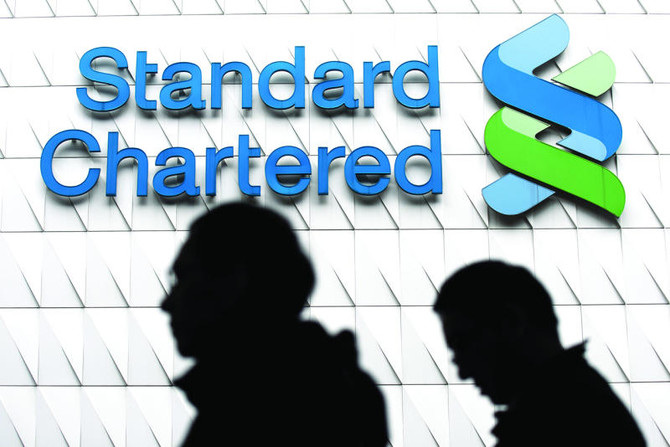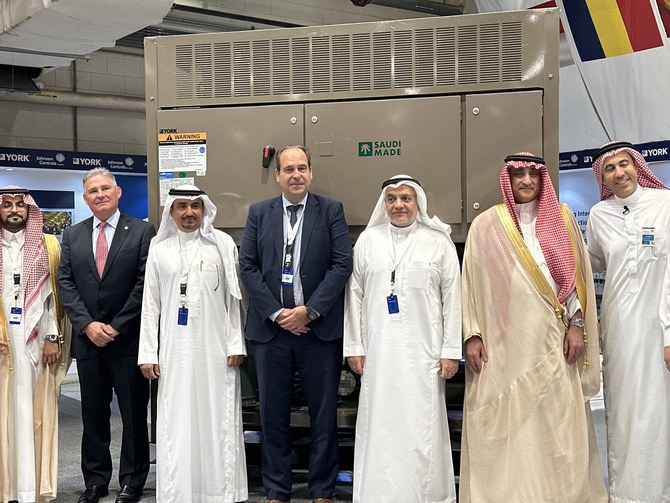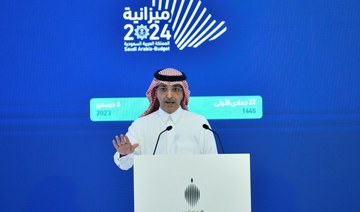LONDON: Standard Chartered’s landmark attempt to claw back bonuses paid to staff deemed responsible for its current woes could be fraught with practical and legal difficulties, lawyers and investors said.
CEO Bill Winters said on Tuesday the bank could recover the bonuses of up to 150 senior staff, if they are found culpable of breaching internal rules during a freewheeling lending era under his predecessor Peter Sands, who left last June.
The attempted clawbacks could represent a test case as to the enforceability of tough new rules put in place by Britain last year, as a response to the financial crisis, allowing banks to seek recovery of bonuses from bankers deemed to have acted irresponsibly up to 10 years after they are paid out.
Lawyers said it would be the first time a bank has sought such clawbacks en masse since the new regulations were put in place. Attempts to recover bonuses have so far been rare, and have focused on individuals accused of clear misconduct.
Winters’ announcement of “robust accountability reviews” came as StanChart reported its first annual loss in 26 years, with bad loans jumping from $7.5 billion at the end of 2014 to $12.8 billion by the end of 2015.
Some investors, however, are not holding their breath for material windfalls from the plan, particularly from those executives who are no longer employed by the bank.
“It is a very reasonable idea, but probably a nightmare to enforce,” one senior manager at a fund that owns Standard Chartered shares said, while a second investor said it may be more practical to design stricter remuneration structures than to try and claw money back.
A spokesman for StanChart in London declined to comment.
LEGAL BATTLEGROUND
Britain has among the world’s toughest rules on banker pay, introduced following public and political anger over lenders being bailed out by taxpayers in the crisis and bankers pocketing big payouts at a time of austerity for many people.
The rules allow for bonuses to be cut, stopped or clawed back where bankers are subsequently found to have acted irresponsibly or breached risk or compliance regulations.
Lawyers familiar with laws governing banker pay said the key distinction was between so-called malus — the cancelation of an intended future payment — and clawbacks, where a bank tries to recover monies already paid out.
The latter is much harder to enforce.
“Even if you have a very well crafted clawback clause, it can be hard in practice to demonstrate that an individual’s behavior has led to a particular result,” said Anna McCaffrey, senior associate in the employment practice at Taylor Wessing.
Clawbacks face several other challenges, including the difficulty of claiming back funds where a banker has moved to another part of the world or another company.
The Bank of England proposed new rules in January to close the loophole for such so-called “roving bad apples” but they are not yet in force so would not apply to the StanChart plan.
Lawyers said that recovering money in such cases, or proving that specific individuals could be blamed for a given failure in risk management by the bank, could be extremely difficult.
“We haven’t seen a big legal fight about clawback yet, and no one really knows how these arguments will play out,” said Jon Gilligan, partner at GQ Employment Law.
‘SYMBOLIC ACTION’
StanChart CEO Winters said on Tuesday that some former senior executives at the bank had already paid a price for the lender’s problems, without naming them.
Long-term share incentives awarded in 2013 expired worthless after some senior executives failed to meet performance targets, the bank’s annual report said. Former finance director Richard Meddings and former consumer banking head Steve Bertamini were among those who failed to meet performance measures and saw those incentives lapse, according to the report.
StanChart has also held back a total of $61 million worth of unvested shares pledged to senior managers and “risk takers” such as traders and loan officers in 2015 due to ‘performance adjustments,’ according to a Reuters calculation from the company’s annual report. Unvested shares are those that will be awarded at a future date, subject to conditions.
Among the most high-profile StanChart bankers at risk of clawback is Mike Rees, the 26-year veteran of the bank and former deputy CEO, who will leave the bank at the end of this year. StanChart said on Jan. 7 that Rees’s unvested share bonuses “remain subject to ... potential clawback.”
Rees was key to the shaping and execution of the bank’s strategy under former CEO Sands.
Lawyers said that while enforcing clawbacks could be fraught with difficulties, the mere attempt could reassure bruised investors — who have seen StanChart shares plunge 31 percent this year — that the lender is trying to promote accountability for risk-takers.
“Pressure may be coming from shareholders, who have lost a lot of money recently, and it’s unlikely you will be able to claw back anything like what they have lost, but it is a symbolic action,” said GQ Employment Law’s Jon Gilligan.
StanChart’s bid to claw back bonuses faces legal quagmire
StanChart’s bid to claw back bonuses faces legal quagmire

Regional collaboration flourishes in effort to boost digital transformation

- Partnership underscores commitment to foster innovation and drive economic empowerment
CAIRO: Digital transformation is on the cusp as regional companies join hands to further boost this technological development across the Middle East and North Africa.
On top of this week’s partnerships, Saudi Arabia’s Alraedah Digital Solutions, the innovation arm of Alraedah Digital Group, inked a deal with regional fintech ABHI to boost financial inclusion in the Kingdom.
Under the terms of the agreement, Alraedah Digital Solutions will harness ABHI’s advanced technological capabilities to introduce a range of innovative financial services tailored to the Saudi market.
The collaboration will focus on leveraging Alraedah’s deep knowledge of local market dynamics to launch new financing products collaboratively.
Additionally, Alraedah has committed to a substantial financial investment, pledging access to $200 million over three years to support the development and localization of ABHI’s products for the Kingdom.
“We are excited to join forces with ABHI to revolutionize the financial landscape in Saudi Arabia. This partnership underscores our commitment to fostering innovation and driving economic empowerment through strategic collaborations. Together, we aim to redefine access to financial services and empower individuals and businesses across the region,” Paul Melotto, CEO at Alraedah Digital Solutions, said.

Founded in 2021, ABHI specializes in earned wage access, invoice factoring, small and medium-sized enterprise working capital, revenue-based financing, and payroll solutions.
To date, ABHI claims to have supported over 1,000 companies, enhancing financial stability for approximately 750,000 employees and processing over $300 million in loans across different regions.
The company is backed by notable investors including Y Combinator, VEF, SpeedInvest, Venture Souq, Global Ventures, and Zayn Capital.
Abu Dhabi’s Comera Financial Holding joins hands with Egypt’s Beltone Holding
Comera Financial Holding, an Abu Dhabi-based group with interests in technology and fintech, has joined forces with Beltone Holding, a prominent financial services provider in Egypt, to enhance digital transformation and customer experience in the North African country.
The strategic partnership focuses on knowledge transfer and the introduction of new digital solutions across the region.
Together, Comera and Beltone aim to develop and deploy advanced products that will elevate customer experiences in various financial sectors, including payments, consumer finance, SME finance, and supply chain financing.

“This collaboration represents a pivotal step forward in our commitment to enhancing digital access and improving financial services for our customers,” Dalia Khorshid, Group CEO of Beltone Holding, said.
The collaboration will leverage both companies’ expertise to introduce cutting-edge technological solutions not only in Egypt but also in other Middle East and North Africa countries.
MoneyHash partners with Visa
US-based, MENA-focused fintech MoneyHash has announced a new collaboration with digital payments firm Visa.
This partnership aims to deliver secure and enhanced digital payment experiences across the region.
By collaborating with Visa, MoneyHash will gain access to an extensive array of Visa’s digital payment solutions, enhancing its service offerings with advanced technologies like network tokenization.
Additionally, this partnership allows MoneyHash to tap into Visa’s vast global reach, capabilities, and renowned security infrastructure.
These elements are crucial to Visa’s mission of connecting the world through an innovative, reliable, and secure payment network, now extending further across the MENA region.
This strategic alliance is set to significantly boost MoneyHash’s capacity to serve its customers with payment solutions.
Dubizzle acquires Drive Arabia
Dubizzle Group, a leading online classifieds platform in the Middle East, has further cemented its position in the automotive sector across the MENA region with the acquisition of Drive Arabia.
Known for its strong brand presence over the past two decades, especially in the UAE and Saudi Arabia, Drive Arabia brings valuable expertise and a loyal customer base to Dubizzle Group.
This acquisition enables Dubizzle Group to enhance its automotive advertising services, introduce innovative new products, and expand its market reach.
The integration of Drive Arabia is expected to significantly bolster Dubizzle Group’s capabilities in meeting the evolving needs of automotive customers across the region.
Egypt’s Swypex secures $4m in seed round
Swypex has announced its emergence onto the financial technology scene with a $4 million seed investment round led by US venture capital fund, Accel.
This investment marks Accel’s first foray into the fintech sector in the region and includes contributions from Foundation Ventures, the Raba Partnership, and several leading industry angel investors.
Licensed by the Central Bank of Egypt, Swypex aims to become the first comprehensive platform that eliminates financial inefficiencies and maximizes business potential in the country.

The platform integrates payments, invoice management, and smart corporate cards into a single system designed to streamline financial operations.
Swypex’s products are tailored to simplify financial management for businesses, allowing them to automate workflows and facilitate easy payments.
The corporate cards offered by Swypex are specifically designed for Egyptian businesses to help reduce costs, enhance operational efficiency, and support scalable growth.
Monsha’at graduates 25 startups from Qassim University
Saudi Arabia’s Small and Medium Enterprises General Authority, also known as Monsha’at, has announced the successful graduation of 25 startups from Qassim University’s business incubator, as part of the University Startups Initiative Program.
The business incubator is designed to facilitate the transition of creative ideas and university graduation projects into market-ready startups capable of securing investments.

During their time in the incubator, the startups managed to increase their client base by 35 percent and successfully secured two investment rounds totaling around SR500,000 ($133,317).
Since its inception in 2023, the University Startups Initiative Program has graduated 75 startups in collaboration with three government universities located in Riyadh, Al-Ahsa, and Qassim.
April startup funding sees sharp decline
Startup funding in the MENA region experienced a sharp decline in April, with only 19 startups raising $55 million.
This represents a 78 percent drop month on month from $254 million raised in March, although it marks an 87 percent increase year on year, according to Wamda’s Monthly report.
The largest funding amount in April was awarded to Fortis, a UAE-based fintech startup, which secured $20 million in a series A round.
This was followed by WEE, which raised $10 million in a pre-series A round, and Tunisia’s Qodek, which garnered $8 million in its series B round.
Geographically, UAE-based startups led the funding charts with $32 million distributed across six deals, while Egyptian startups received $8.7 million over five deals.
In contrast, Saudi startups saw a noticeable decrease in investment, attracting only $4.8 million across three deals.
Sector-wise, fintech remained the most funded, with four companies raising $25.7 million, $20 million of which was allocated to Fortis alone.
E-commerce startups received $10.5 million across two funding rounds, and an AI firm, Qodek, raised $8 million. Additionally, three Software-as-a-Service providers collectively raised $3.5 million.
In terms of gender representation in funding, disparities remain significant.
Only one female-founded firm managed to secure $100,000, in stark contrast to the $43 million received by male-founded companies, highlighting ongoing challenges in achieving gender parity in the startup ecosystem.
Johnson Controls Arabia celebrates export milestone of Saudi-made scroll chillers to US

JEDDAH: A batch of 300 Saudi-made scroll chillers are set to be exported to the US in what is a first for the Kingdom, the CEO of Johnson Controls Arabia has announced.
Speaking to Arab News, Mohamad Al-Shaikh revealed the market value of the products stands at SR100 million ($26.66 million), and the shipment will come from the Johnson Controls Arabia Manufacturing Complex in King Abdullah Economic City.
Though the domestic demand for heating, ventilation, and air conditioning equipment and technology is growing, the total addressable market for Saudi Arabia is still small compared to the global demand, the executive said.
Reflecting on the milestone of the company’s largest export order to date, Al-Shaikh said: “It is a very proud moment for us as a Saudi company to reach a level where our Saudi-made products are compliance competitive to meet all the quality requirements according to the specification for the United States’ market.
“We have reached the maturity level where we are able to use Saudi talents, Saudi engineering and Saudi supply of chain to ship our fine products to the US market.”

The company plans to increase exports from 30 percent to 60 percent of its total production output over the next three years, aligning with the national industrial strategy and Vision 2030 to enhance economic diversification and local production development.
He said: “We are thrilled also to announce our most ambitious and largest export order of 1,000 YORK Scroll Chillers for next year over three phases.”
The event also housed the signing of a memorandum of understanding between Johnson Controls Arabia and the Saudi Export Development Authority.
This agreement aims to establish a strategic account for JCA, enhancing Saudi Arabia's non-oil exports capable of competing on a global scale, in line with Vision 2030.
Additionally, Johnson Controls Arabia announced the groundbreaking for a new factory expansion, supported by the Local Content and Government Procurement Authority. The expansion will start manufacturing water-cooled chillers with a high capacity of up to 6,000 tons of cooling, the world’s largest air conditioning product.
During his opening keynote, Al-Shaikh underscored the company’s dedication to innovation, sustainability, and supporting the local content through exports of Saudi-made products.
“This milestone reflects our unwavering commitment to advancing local content and the Saudi-made initiative, which are integral to the Kingdom's economic diversification efforts. By exporting Saudi-made products to the US market and 26 other global markets, we are not only contributing to the growth of our economy but also showcasing the quality and innovation of our Saudi products on a global stage,” he stated.
After commending the long-standing bilateral trade relations between the Kingdom and the US, Al-Shaikh added: “At JCA, we have a vision and a strong commitment to the Saudi Market, where we focus on reinforcing localization and boosting job creation to support the economy while giving back to the community.”
Johnson Controls Arabia has made significant strides in local manufacturing, with 80 percent of its sales coming from locally manufactured products.
The company’s exports have also grown to account for over 30 percent of its total production, demonstrating its commitment to global expansion and market diversification.
Saudi Arabia to reveal roadmap to turn aviation sector into $2bn industry

RIYADH: An ambitious roadmap setting out how Saudi Arabia will grow its aviation sector tenfold into a $2 billion industry will be unveiled at a special event in May.
The plans cover the business jet segment, including charter, private, and corporate aircrafts, and will support Saudi Arabia’s development as a global high-value enterprise and tourist destination.
Details of the roadmap will be set out at the 2024 Future Aviation Forum, convening 5,000 leaders, including private investors, operators, and service providers, set to be held in Riyadh from May 20 to 22.
The plan comes after Saudi Arabia revised its 2030 tourism target upwards from 100 million to 150 million visitors in October 2023.
The forum is set to be hosted by the General Authority of Civil Aviation, and the organization’s President Abdulaziz-Al Duailej said: “General aviation is vital to growing high-value sectors of the Saudi economy, including tourism, business and entertainment events.
“The General Aviation roadmap will turbocharge the sector within the Kingdom, transforming infrastructure and regulations, simultaneously developing, promoting and enhancing general aviation services in the market.
“GACA looks forward to hosting general aviation investors, operators and service providers at the Future Aviation Forum in May, where we will launch this ambitious plan to global audiences.”
The roadmap will support private aviation aircraft owners, lessors, and investors, as well as operators and service providers, through coordinated infrastructure investment and regulatory streamlining.
The announcement follows GACA’s removal of “empty-leg restrictions” – which relate to when an aircraft is flying without passengers or cargo on board – and simplification of economic license requirements for operators and investors in October 2023, to boost the general aviation sector.
FAF 2024 will see aviation leaders from over 100 countries, including ministers, regulators, manufacturers, airlines, and airports, gathering in Riyadh.
It has already been announced that the event will see Saudi Arabia unveil more than $100 billion in investment opportunities to enable its ambitious Saudi Aviation Strategy.
The forum’s investment showcase will highlight projects and incentives including airports, airlines, ground services, cargo and logistics.
Of the $100 billion in investment opportunities, airports account for more than $50 billion, new aircraft orders about $40 billion, while the remaining $10 billion is earmarked for other projects, including $5 billion in special logistics areas around the main airports in Riyadh, Jeddah, and Dammam.
The 2022 edition of the forum saw the signing of more than 50 agreements and $2.7 billion in deals, and the upcoming event will feature commercial announcements, alongside the roadmap and specialist general aviation panel sessions.
Saudi Arabia’s Q1 budget deficit aligns with expectations; non-oil revenues rise by 9%

RIYADH: Saudi Arabia recorded a budget deficit of SR12.4 billion ($3.3 billion) in the first quarter of 2024, comprising 16 percent of the annual deficit forecast set by the Ministry of Finance at the end of the previous year.
This suggests that it aligns with expectations, showcasing the Kingdom’s progress in accelerating spending related to Vision 2030 implementation, alongside its careful fiscal management.
The Ministry’s quarterly performance report also revealed an annual 9 percent boost in its non-oil revenues to reach SR293.43 billion, primarily driven by increased taxes on goods and services.
Report data showed these taxes surged by 11 percent to approximately SR70 billion in the specified period. This income source constituted nearly a quarter of total government revenues and approximately 63 percent of non-oil income.
This typically refers to taxes imposed on particular products or services, rather than on individuals or businesses as a whole. Examples include Excise Tax, Value-Added Tax, and specific levies such as those targeting expatriates.
The percentage share of non-oil revenues from the overall government income increased to 38 percent, up from 36 percent in the same quarter of 2023.
The second largest factor driving the non-oil revenue growth is categorized as Other Revenues, which, as per the Ministry’s report, includes income from a variety of sources.
These encompass revenues from other public government units, including the Saudi Central Bank, sales conducted by other entities such as income from advertising and fees from port services, administrative fees, fines, penalties, and confiscations.
Conversely, oil revenues experienced a 2 percent uptick, reaching SR181 billion. However, their percentage share decreased from 64 percent in the same quarter the previous year to 62 percent. This brought total government revenues to SR293.43 billion.
The tightening of oil revenues can be linked to the voluntary oil production cuts adopted by members of the Organization of the Petroleum Exporting Countries and their allies, known as OPEC+. Saudi Arabia announced in March the extension of its 1 million barrels per day cut, initially implemented in July 2023, until the end of the second quarter of 2024.

Government expenditure
Expenditures surged by 8 percent during this period, reaching SR305.82 billion, with non-financial capital expenditure, often referred to as CAPEX, driving much of this growth.
This category saw a substantial 33 percent increase, totaling SR34.5 billion, and it encompasses investments in physical assets like buildings, machinery, and infrastructure, aimed at enhancing the Kingdom’s capacity and capabilities.
The Ministry had indicated in its budget statement in December for the fiscal year 2024 that there will be increased spending during the coming years to expedite the implementation of key programs vital to the objectives of Saudi Vision 2030. Therefore, the quarterly deficit remains within expectations, reflecting prudent fiscal management.
The second most significant factor driving the increase in expenditure is the utilization of goods and services, which surged by 12 percent during this period, reaching SR60.7 billion. Accounting for 20 percent of total expenditure, their substantial share amplified their impact.
This category represents the total amount spent on acquiring goods and services by the government for various purposes, such as operational activities or resale. It reflects the government’s consumption or investment in resources necessary for its operations, excluding any changes in inventory levels.
In third place was the compensation of employees, making up the largest portion of the total at 45 percent, reaching SR137.5 billion. However, its growth during this period was only 3 percent.
According to the Ministry’s report, this refers to the compensation received by an employee for the work they perform, which can be in the form of cash or non-monetary benefits. It includes any social security contributions that the government unit pays on behalf of its employees.
Although subsidies account for a small portion of government spending, at 3 percent, they experienced the highest growth rate, reaching SR8.33 billion, highlighting the Kingdom’s dedication to investments in education, health, and social protection programs.
Additionally, the data revealed that health and social development were the second-largest contributors to expenditure growth, increasing by 20 percent to reach SR60.5 billion, following municipal services.
The Ministry’s report indicated that the deficit will be covered entirely through borrowing. Domestic debt accounted for 60 percent, or SR665.03 billion, of the end-of-period debt balance, while the remaining 40 percent came from external debt, totaling SR450.8 billion.
Compared to advanced economies or G20 countries, Saudi Arabia’s public debt as a percentage of GDP remains relatively low. Additionally, it is well-covered, with government reserves totaling around SR392 billion in the first quarter of this year.
This robust reserve level provides a substantial buffer against any potential financial challenges or economic downturns, enhancing the Kingdom’s fiscal stability and ability to meet its financial obligations.
Startup Wrap – Regional collaboration flourishes in effort to boost digital transformation

CAIRO: Digital transformation is on the cusp as regional companies join hands to further boost this technological development across the Middle East and North Africa.
On top of this week’s partnerships, Saudi Arabia’s Alraedah Digital Solutions, the innovation arm of Alraedah Digital Group, inked a deal with regional fintech ABHI to boost financial inclusion in the Kingdom.
Under the terms of the agreement, Alraedah Digital Solutions will harness ABHI’s advanced technological capabilities to introduce a range of innovative financial services tailored to the Saudi market.
The collaboration will focus on leveraging Alraedah’s deep knowledge of local market dynamics to launch new financing products collaboratively.
Additionally, Alraedah has committed to a substantial financial investment, pledging access to $200 million over three years to support the development and localization of ABHI’s products for the Kingdom.
“We are excited to join forces with ABHI to revolutionize the financial landscape in Saudi Arabia. This partnership underscores our commitment to fostering innovation and driving economic empowerment through strategic collaborations. Together, we aim to redefine access to financial services and empower individuals and businesses across the region,” Paul Melotto, CEO at Alraedah Digital Solutions, said.

Founded in 2021, ABHI specializes in earned wage access, invoice factoring, small and medium sized enterprise working capital, revenue-based financing, and payroll solutions.
To date, ABHI claims to have supported over 1,000 companies, enhancing financial stability for approximately 750,000 employees and processing over $300 million in loans across different regions.
The company is backed by notable investors including Y Combinator, VEF, SpeedInvest, Venture Souq, Global Ventures, and Zayn Capital.
Abu Dhabi’s Comera Financial Holding joins hand with Egypt’s Beltone Holding
Comera Financial Holding, an Abu Dhabi-based group with interests in technology and fintech, has joined forces with Beltone Holding, a prominent financial services provider in Egypt, to enhance digital transformation and customer experience in the North African country.
The strategic partnership focuses on knowledge transfer and the introduction of new digital solutions across the region.
Together, Comera and Beltone aim to develop and deploy advanced products that will elevate customer experiences in various financial sectors, including payments, consumer finance, SME finance, and supply chain financing.
“This collaboration represents a pivotal step forward in our commitment to enhancing digital access and improving financial services for our customers,” Dalia Khorshid, Group CEO of Beltone Holding, said.
The collaboration will leverage both companies’ expertise to introduce cutting-edge technological solutions not only in Egypt but also in other Middle East and North Africa countries.
MoneyHash partners with Visa
US-based, MENA-focused fintech MoneyHash has announced a new collaboration with digital payments firm Visa.
This partnership aims to deliver secure and enhanced digital payments experiences across the region.
By collaborating with Visa, MoneyHash will gain access to an extensive array of Visa’s digital payment solutions, enhancing its service offerings with advanced technologies like network tokenization.
Additionally, this partnership allows MoneyHash to tap into Visa’s vast global reach, capabilities, and renowned security infrastructure.
These elements are crucial to Visa’s mission of connecting the world through an innovative, reliable, and secure payment network, now extending further across the MENA region.
This strategic alliance is set to significantly boost MoneyHash’s capacity to serve its customers with payment solutions.
Dubizzle acquires Drive Arabia
Dubizzle Group, a leading online classifieds platform in the Middle East, has further cemented its position in the automotive sector across the MENA region with the acquisition of Drive Arabia.
Known for its strong brand presence over the past two decades, especially in the UAE and Saudi Arabia, Drive Arabia brings valuable expertise and a loyal customer base to Dubizzle Group.
This acquisition enables Dubizzle Group to enhance its automotive advertising services, introduce innovative new products, and expand its market reach.
The integration of Drive Arabia is expected to significantly bolster Dubizzle Group’s capabilities in meeting the evolving needs of automotive customers across the region.
Egypt’s Swypex secures $4m in seed round

Swypex has announced its emergence onto the financial technology scene with a $4 million seed investment round led by US venture capital fund, Accel.
This investment marks Accel’s first foray into the fintech sector in the region and includes contributions from Foundation Ventures, the Raba Partnership, and several leading industry angel investors.
Licensed by the Central Bank of Egypt, Swypex aims to become the first comprehensive platform aimed at eliminating financial inefficiencies and maximizing business potential in the country.
The platform integrates payments, invoice management, and smart corporate cards into a single system designed to streamline financial operations.
Swypex’s products are tailored to simplify financial management for businesses, allowing them to automate workflows and facilitate easy payments.
The corporate cards offered by Swypex are specifically designed for Egyptian businesses to help reduce costs, enhance operational efficiency, and support scalable growth.
Monsha’at graduates 25 startups from Qassim University
Saudi Arabia’s Small and Medium Enterprises General Authority, also known as Monsha’at, has announced the successful graduation of 25 startups from Qassim University’s business incubator, as part of the University Startups Initiative Program.
The business incubator is designed to facilitate the transition of creative ideas and university graduation projects into market-ready startups capable of securing investments.
During their time in the incubator, the startups managed to increase their client base by 35 percent and successfully secured two investment rounds totaling around SR500,000 ($133,317).
Since its inception in 2023, the University Startups Initiative Program has graduated 75 startups in collaboration with three government universities located in Riyadh, Al-Ahsa, and Qassim.
April startup funding sees sharp decline
Startup funding in the MENA region experienced a sharp decline in April, with only 19 startups raising $55 million.
This represents a 78 percent drop month-on-month from $254 million raised in March, although it marks an 87 percent increase year-on-year, according to Wamda’s Monthly report.
The largest funding amount in April was awarded to Fortis, a UAE-based fintech startup, which secured $20 million in a series A round.
This was followed by WEE, which raised $10 million in a pre-series A round, and Tunisia’s Qodek, which garnered $8 million in its series B round.
Geographically, UAE-based startups led the funding charts with $32 million distributed across six deals, while Egyptian startups received $8.7 million over five deals.
In contrast, Saudi startups saw a noticeable decrease in investment, attracting only $4.8 million across three deals.
Sector-wise, fintech remained the most funded, with four companies raising $25.7 million, $20 million of which was allocated to Fortis alone.
E-commerce startups received $10.5 million across two funding rounds, and an AI firm, Qodek, raised $8 million. Additionally, three Software-as-a-Service providers collectively raised $3.5 million.
In terms of gender representation in funding, disparities remain significant.
Only one female-founded firm managed to secure $100,000, in stark contrast to the $43 million received by male-founded companies, highlighting ongoing challenges in achieving gender parity in the startup ecosystem.













